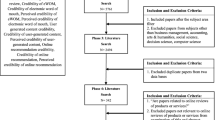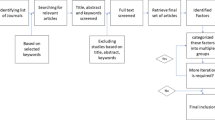Abstract
Digital ecosystems rely on reputation systems in order to build trust and to foster collaborations among users. Reputation systems are commonplace in the Customer-to-Customer and Business-to-Customer contexts, however, they have not yet found mainstream acceptance in Business-to-Business (B2B) environments. Our first contribution in this paper is to identify the particularities of feedback collection in B2B reputation systems. An issue that we identify is that the reputation target in the B2B context is a business, which requires evaluation on a large number of criteria. We observe that due to the wide variation in user expertise, feedback forms that require users to evaluate all criteria have significant negative consequences for rating accuracy. Our second contribution is to propose an expertise prediction algorithm for B2B reputation systems, which filters the criteria describing the target business such that each user rates only on those criteria that he has expertise in. Experiments based on our real dataset show that the algorithm accurately predicts the expertise of users in given criteria. The algorithm may also increase the motivation of users to submit feedback as well as the confidence of users in B2B reputation systems.





Similar content being viewed by others
References
Adomavicius G, Tuzhilin A (2005) Toward the next generation of recommender systems: a survey of the state-of-the-art and possible extensions. IEEE Trans Knowl Data Eng 17(6):734–749. doi:10.1109/TKDE.2005.99
Burke R (2002) Hybrid recommender systems: survey and experiments. User Model User Adapt Interact. 12(4):331–370. doi:10.1023/A:1021240730564
Carlsson C (2008) Ratings and reviews for the business user—a presentation of results from the author’s mba dissertation at henley management college, UK. https://sites.google.com/site/businessuserreviews/
Chen M, Singh JP (2001) Computing and using reputations for internet ratings. In: Proceedings of the 3rd ACM conference on electronic commerce, ACM, New York, NY, USA, EC ’01, pp 154–162. doi:10.1145/501158.501175
Cheng J, Condry M, Karduck AP (2013) Call for papers—7th IEEE international conference on digital ecosystems and technologies (IEEE dest 2013). http://dest2013.digital-ecology.org/
Dellarocas C (2003) The digitization of word of mouth: promise and challenges of online feedback mechanisms. Manage Sci 49(10):1407–1424. doi:10.1287/mnsc.49.10.1407.17308
Dellarocas CN, Fan M, Wood CA (2004) Self-interest, reciprocity and participation in online reputation systems. Working Papers 4500–04, MIT Sloan. http://ssrn.com/abstract=585402
Fung H (2011) Rate this page? is coming to the english wikipedia. http://blog.wikimedia.org/2011/07/15/
Golbeck J, Hendler J (2006) Inferring binary trust relationships in web-based social networks. ACM Trans Internet Technol 6(4):497–529. doi:10.1145/1183463.1183470
Goldberg K, Roeder T, Gupta D, Perkins C (2001) Eigentaste: a constant time collaborative filtering algorithm. Inf Retr 4(2):133–151. doi:10.1023/A:1011419012209
Grcar M (2004) User profiling: collaborative filtering. In: Proceedings of the 7th international multiconference information society IS, pp 75–78
Harper FM, Li X, Chen Y, Konstan JA (2005) An economic model of user rating in an online recommender system. In: Proceedings of the 10th international conference on user modeling. Springer, Berlin, Heidelberg, UM’05, pp 307–316. doi:10.1007/11527886_40
Hasan O, Brunie L, Bertino E (2012) Preserving privacy of feedback providers in decentralized reputation systems. Comput Secur 31(7): 816–826
Hoffman K, Zage D, Nita-Rotaru C (2009) A survey of attack and defense techniques for reputation systems. ACM Comput Surv 41(4)
Houser D, Wooders J (2001) Reputation in auctions: theory and evidence from eBay.Mimeo
Jamieson S (2004) Likert scales: how to (ab)use them. Med Educ 38(12):1217–1218. doi:10.1111/j.1365-2929.2004.02012.x
Jøsang A, Ismail R, Boyd C (2007) A survey of trust and reputation systems for online service provision. Decis Support Syst 43(2):618–644
JStueland V (2004) Supplier evaluation: best practices and creating or improving your own evaluation. In: 89th annual international supplier management conference
Kompass (2012) Le processus d’achat b2b. http://fr.kompass.com/espace-business/index.php?option=com&view
Koren Y, Bell R, Volinsky C (2009) Matrix factorization techniques for recommender systems. Computer 42(8):30–37. doi:10.1109/MC.2009.263
Lakiotaki K, Matsatsinis NF, Tsoukias A (2011) Multicriteria user modeling in recommender systems. IEEE Intell Syst 26:64–76. doi:10.1109/MIS.2011.33
Lampe C, Garrett RK (2007) It’s all news to me: the effect of instruments on ratings provision. In: Proceedings of the 40th annual Hawaii international conference on system sciences, IEEE Computer Society, Washington, DC, USA, HICSS ’07, pp 180b. doi:10.1109/HICSS.2007.308
Lee S, Song Si, Kahng M, Lee D, Lee Sg (2011) Random walk based entity ranking on graph for multidimensional recommendation. In: Proceedings of the fifth ACM conference on recommender systems, ACM, New York, NY, USA, RecSys ’11, pp 93–100. doi:10.1145/2043932.2043952
Liu L, Munro M (2012) Systematic analysis of centralized online reputation systems. Decis Support Syst 52(2):438–449. doi:10.1016/j.dss.2011.10.003
Liu L, Mehandjiev N, Xu DL (2011) Multi-criteria service recommendation based on user criteria preferences. In: Proceedings of the fifth ACM conference on recommender systems, ACM, New York, NY, USA, RecSys ’11, pp 77–84. doi:10.1145/2043932.2043950
McLaughlin MR, Herlocker JL (2004) A collaborative filtering algorithm and evaluation metric that accurately model the user experience. In: Proceedings of the 27th annual international ACM SIGIR conference on research and development in information retrieval, ACM, New York, NY, USA, SIGIR ’04, pp 329–336. doi:10.1145/1008992.1009050
Miller B, Riedl JT, Konstan JA (1997) Experiences with grouplens: making usenet useful again. In: Proceedings of the 1997 Usenix Winter technical conference, pp 219–231
Ortega F, SáNchez JL, Bobadilla J, GutiéRrez A (2013) Improving collaborative filtering-based recommender systems results using pareto dominance. Inf Sci 239:50–61. doi:10.1016/j.ins.2013.03.011
Ozakca M, Lim YK (2006) A study of reviews and ratings on the internet. In: CHI ’06 extended abstracts on human factors in computing systems, ACM, New York, NY, USA, CHI EA ’06, pp 1181–1186. doi:10.1145/1125451.1125673
Pal A, Konstan JA (2010) Expert identification in community question answering: exploring question selection bias. In: Proceedings of the 19th ACM international conference on information and knowledge management, ACM, New York, NY, USA, CIKM ’10, pp 1505–1508. doi:10.1145/1871437.1871658
Parra D, Karatzoglou A, Amatriain X, Yavuz I (2011) Implicit feedback recommendation via implicit-to-explicit ordinal logistic regression mapping. In: In CARS Workshop at RecSys
Pinyol I, Sabater-Mir J (2011) Computational trust and reputation models for open multi-agent systems: a review. Artif Intell Rev. doi:10.1007/s10462-011-9277-z
Resnick P, Kuwabara K, Zeckhauser R, Friedman E (2000) Reputation systems. Commun ACM 43(12):45–48
Sabater J, Sierra C (2005) Review on computational trust and reputation models. Artif Intell Rev 24(1):33–60
Schafer JB, Konstan J, Riedi J (1999) Recommender systems in e-commerce. In: Proceedings of the 1st ACM conference on electronic commerce, ACM, New York, NY, USA, EC ’99, pp 158–166
Sparling EI, Sen S (2011) Rating: how difficult is it? In: Proceedings of the fifth ACM conference on recommender systems, ACM, New York, NY, USA, RecSys ’11, pp 149–156
Swearingen K, Sinha R (2002) Interaction design for recommender systems. In: Designing Interactive Systems, Vol. 6, No. 12. ACM Press, pp. 312–334
Yesilada Y, Brajnik G, Harper S (2009) How much does expertise matter? A barrier walkthrough study with experts and non-experts. In: Proceedings of the 11th international ACM SIGACCESS conference on computers and accessibility, ACM, New York, NY, USA, Assets ’09, pp 203–210
Zacharia G (2000) Trust management through reputation mechanisms. Appl Artif Intell 14:881–907
Zhang J, Ackerman MS, Adamic L, Nam KK (2007) Qume: a mechanism to support expertise finding in online help-seeking communities. In: Proceedings of the 20th annual ACM symposium on user interface software and technology, ACM, New York, NY, USA, UIST ’07, pp 111–114
Author information
Authors and Affiliations
Corresponding author
Rights and permissions
About this article
Cite this article
Dikow, H., Hasan, O., Kosch, H. et al. Improving the accuracy of Business-to-Business (B2B) reputation systems through rater expertise prediction. Computing 97, 29–49 (2015). https://doi.org/10.1007/s00607-013-0345-x
Received:
Accepted:
Published:
Issue Date:
DOI: https://doi.org/10.1007/s00607-013-0345-x




